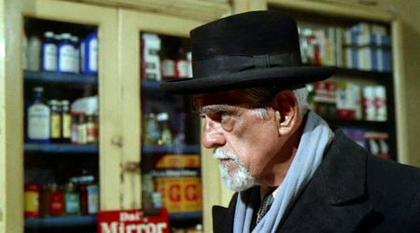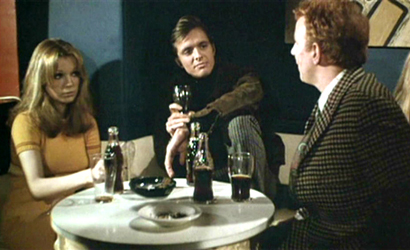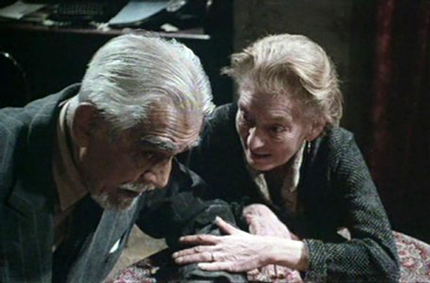
 |
|
|
|
Michael Reeves is a peculiar case in that his short directing career was just beginning to attract serious attention when he died. A movie-crazed vagabond years before film schools started churning them out by the thousands, Reeves went straight to Hollywood from his home in the UK, and introduced himself to director Don Siegel - by ringing his front doorbell. Then it was off to Italy with young producer Paul Maslansky, who gave him the job of shooting second-unit on his Christopher Lee horror film Castle of the Living Dead. Reeves and Maslansky then teamed for the impoverished but resourceful horror effort The She-Beast. That attracted the attention of producer Tony Tenser, who funded this movie, The Sorcerers. It did well enough that A.I.P. hired Michael Reeves for the movie that made his reputation. 1968's Witchfinder General is a politically challenging period horror effort starring Vincent Price in a role that offered a dramatic contrast with the madmen of his earlier Corman-Poe pictures. But just as his career was breaking out, Michael Reeves died at only 25 years of age. We never found out if he would continue as a genre practitioner or springboard into mainstream directing. In that sense Reeves has been compared to James Dean, who died after three stellar pictures. His career potential is an object for speculation. What do the four pictures tell us? Castle of the Living Dead is a polished Euro-horror item. Reeves' participation has been described as everything from just helping out by staging a few 'shows within the show' performed by a group of traveling players, to taking over the bulk of the direction. The She-Beast makes use of Maslansky's experience as a location man in Yugoslavia. The half-comedic script is tailored to feature Barbara Steele, yet to hire her for only a few days. Reeves is forced to pad the picture with other sub-plots yet proves himself adept at maintaining a high level of interest. 
The Sorcerers has the same kind of producer-friendly script. The star is Boris Karloff, who by 1967 was in such a frail condition that he mostly played men in wheelchairs, or remained seated through his roles. But the man loved to work. Michael Reeves' screenplay begins with a shot of Karloff walking on the street, but for most of the rest of the film he's confined to an apartment. A few years before it was common for cheapie productions to hire a name star only for a couple of day's work (if that). The name star would be separate from most of the action, perhaps talking to the real players over the phone. Basi Rathbone made a few space movies in which he mostly stayed in one control room set, communicating over a radio microphone. John Carradine was the king of this practice, taking star billing but remaining an irrelevant character commenting on the action. He often appeared as an on-screen narrator in framing stories: "Let me tell you what happened to my friends during the expedition..." The Sorcerers makes much more creative use of Boris Karloff. This is Reeves' first movie with a reasonably ambitious theme. In a seedy corner of London, Professor Marcus Monserrat and his wife Estelle (Boris Karloff & Catherine Lacey, a smart acting pair) have been living like outcasts for years, ever since the media demolished his reputation as a hypnotherapist. But now Marcus thinks he's perfected a remote-control hypnotic experience-transference device. Nobody responds to Marcus's ads, so he finds a likely candidate moping in a cafe. Young antiques dealer Mike Roscoe (Ian Ogilvy) leads a swinging lifestyle. Despite being a success with girls he feels bored and unmotivated. He allows himself to be hooked up to Monserrat's electronic conditioning machine but decides that the old man has nothing to offer. Little does Mike realize that Marcus and Estelle can now 'tune in' to Mike's brain, and vicariously experience everything he experiences, even tactile sensations. Marcus believes his invention will allow invalids and old people to live fuller lives, at least second-hand. But the frustrated Estelle is thrown into raptures of pleasure as she mentally participates in Mike's experiences -- dancing, drinking, making love. She begs her husband to continue monitoring Mike, and is soon dominating the process. Estelle wills Mike to steal a fur coat for her and to ride a motorbike at dangerously high speeds. This plays havoc with Mike's love life, as he walks out on his steady girl Nicole (Elizabeth Ercy) and frightens her with his erratic behavior. Mike experiences mental blackouts when Estelle takes control of his body. The old woman has become unbalanced and is indulging a previously undetected appetite for violence. Marcus cannot prevent Estelle from inducing Mike to murder an old girlfriend (Susan George) and to seek other victims. Nicole and Mike's friend Alan (Victor Henry) decide that something is very wrong, but agree to talk to Mike before calling the police... The Sorcerers is a conceptually intriguing horror/Sci-fi hybrid that easily outpaces other exploitation genre efforts. It's so well made that it almost escapes that ghetto, as had the Tenser-funded Roman Polanski film Repulsion of a couple of years before. Reeves manages a good swingin' London atmosphere, especially during the scenes in the music clubs. Ian Ogilvy's Mike is an attractive lead, and his acting when possessed downplays the usual "I'm acting against my will!" clichés. On the downside, Mike and Nicole never become more than victims. We see no deeper into their needs and anxieties. The script never lets Mike even guess that his visit to the Monserrats has any bearing on his behavior problems, so the storylines never reconnect. 
Genre films normally marginalize the participation of older characters, especially women, but Catherine Lacey's Estelle Monserrat is really the central figure here. The woman has become an unrestrained monster, sating herself on all the vices normally ascribed to irresponsible youth. Addicted to sensation, Estelle cares about nothing else. Here at last is an exploitation movie with something relevant to say about the much-abused Generation Gap. According to The Sorcerers old age doesn't bring wisdom; it instead enforces limits that prevent older adult from indulging in the same lifestyle behaviors they condemn in young people. It's an oversimplification, but it's true. Marcus enjoys the vicarious feeling of swimming in an indoor pool, but he hasn't a yearning for wilder physical transgressions. Estelle, on the other hand, feels that she has sacrificed her life to responsibilities and drudgery. She welcomes the idea of living some of it again, the more dangerously the better. 1 Estelle knows that she's living her fantasies of theft and speed, sex and violence at Mike's expense, and yet couldn't care less. Her selfish actions make him ruin his relationships, risk his life and kill just to provide her with thrills. The Sorcerers has a unique view of generational unrest, all right - it promotes the idea that the older generation feeds off the younger one. In 1967 the Vietnam War draft made this idea seem a 100% reality. Not to go too far afield, but the idea of Marcus and Estelle Monserrat sitting at their dinette table 'experiencing' Mike's life by remote control also seems very similar to the idea of Perky Pat in Philip K. Dick's must-read book The Three Stigmata of Palmer Eldritch. In that story, humble pioneers on Mars ingest a drug that allows them to communally 'inhabit' the consciousness of a consumer toy character named Perky Pat. They indulge forbidden fantasies while in the Barbie-like Perky Pat alternate reality. Michael Reeves' Estelle is doing the same thing with Mike, except that Mike is a human being. See also the perverse mind control theme folded into Tod Browning's The Devil-Doll, in which a miniaturized human is forced to do the bidding of its hypnotic controller. Ian Ogilvy makes a fine Mike, becoming more confused and closed off when believes that he's gone insane. Elizabeth Ercy's Nicole is a balanced young woman, not the Discotheque Dolly type that proliferates in 'youth' movies made by the dirty old men at places like Hammer. A very young Susan George has a brief but memorable bit as a victim. Sally (aka Dani) Sheridan sings a pop song, and would later be featured in On Her Majesty's Secret Service. 
Boris Karloff plays the Professor in a subdued fashion, as he's the passive partner in his relationship with Estelle. The fact that he's so inactive makes him seem a bit disconnected to his own sci-fi hypno-watchamacalit device. But the scenes of Monserrat trying to curb the excesses of his sensation-hungry spouse are quite unique. Catherine Lacey gave a major boost to every picture she was ever in, starting with her stint as the Nun with the High Heels in Hitchcock's 1938 The Lady Vanishes. By this time she was playing ditzy old coots, so it's quite a pleasure to see her with a character this complex. The movie seems most alive when Estelle waxes ecstatic about her exciting new sensual adventures. If The Sorcerers weakens at the end, it's because it does not tie Mike and Nicole back in with the older couple, which would seem the only really satisfying way to end the show. The violent finish seems imposed by commercial necessity -- how much better it would be for Marcus to retake control and save the day. Peter Bogdanovich seemed to grasp the appeal of this in his Targets of the year before, where he paid respect to the great Karloff by letting the monster-man prevail. 
The Warner Archive Collection DVD-R of The Sorcerers is a good rendering of a film that always looked awful, if it could be found at all. Older TV prints looked seriously reamed and the one theatrical print I saw at the American Cinematheque (with a very excited crowd) was a faded mess. The WAC's copy is probably accurate. Colors are a bit cold but that's probably intentional. The end title has a mean emulsion scratch, but for noticeable damage that's all there is. Sound is excellent; this is the first time I've enjoyed the rock music sequences, or noticed that Paul Ferris' music track is making a meaningful contribution. The 1:78 framing really helps, restoring compositions and focusing our attention on the actors' faces. Michael Reeves' direction is smooth in dialogue scenes and assured in the action sequences. I think he hit his stride on this picture, limited resources or no.
On a scale of Excellent, Good, Fair, and Poor,
The Sorcerers rates:
Footnote:
1. I myself have often daydreamed that I would like to have a dozen lives to spend... the first thing I'd do is buy a big motorcycle. With only one life, I can just see myself smashed up or dead on the highway, as has happened to two fellows I knew. Am I just being responsible, or is mine a life not lived "to the fullest", a self-doubt encouraged by the consumer culture? Beats me.
Reviews on the Savant main site have additional credits information and are often updated and annotated with reader input and graphics. Also, don't forget the 2011 Savant Wish List. T'was Ever Thus.
Review Staff | About DVD Talk | Newsletter Subscribe | Join DVD Talk Forum |
| ||||||||||||||||||